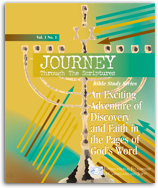
Journey Through The Scriptures
Isaiah III
Lesson 1: God’s Judgment on Babylon
(Scripture to Read: Isaiah 45:1–47:15)
Our third and final study of Isaiah’s prophecy begins where the previous study ended: namely, with a prophetic look at the way God would use Cyrus of Persia, a pagan king, to accomplish God’s purposes in freeing His people from captivity in Babylon and judging their oppressors. Indeed, Cyrus’s place in God’s sovereign plan was so extraordinary that he was not only called the Lord’s “shepherd” (44:28), but even His “anointed,” literally “messiah” (45:1). But in the same passage God said of the Persian monarch, “You have not acknowledged me” (v. 5). Cyrus was an unwitting tool in the hand of God, as history makes clear in Cyrus’s own annals as he credited his victory over Babylon to his idols.
We should not be surprised to find mystery in the ways of God. He raises up and brings down those whom He chooses. The remainder of chapter 45 is a statement of God’s uniqueness, power, and glory as the only true God and Creator. But He is not a hidden Deity who refuses to make Himself known to His creatures. He is the “God and Savior of Israel” (45:15) who desires righteousness and salvation to flourish among His people. And because God is righteous and just, He will judge His enemies. What follows in Isaiah 46–47 is a prediction of fearsome judgment on Babylon, accomplished 150 years later in 539 BCE when Cyrus conquered the Babylonian kingdom and issued his decree to allow the Jews to return to Jerusalem and rebuild the Temple.
Study Questions
- Why did God refer to King Cyrus as His “anointed” one or messiah (45:1)?
- For whose sake did God call Cyrus to defeat the Babylonians?
- What stark contrast is made in Isaiah 46:14 between the gods of the Babylonians and the true God?
- How might we summarize the message of Isaiah 45–47?
Something to Think About
The marvelous picture God gives of His creative power and authority in Isaiah 45 serves as an often-needed reminder to us that as the creature instead of the Creator, we do well to bow in humility and obedience before the Lord.



